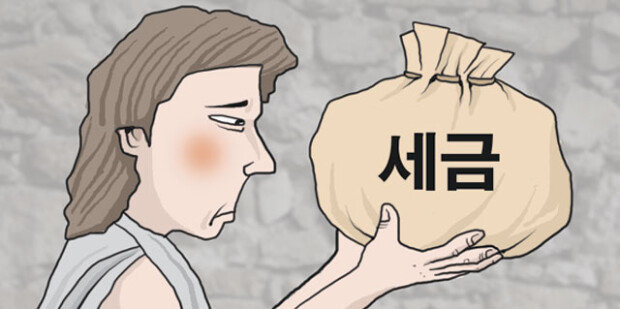Good and evil does not rule the country
Good and evil does not rule the country
Posted December. 18, 2018 07:37,
Updated December. 18, 2018 07:37

A long time ago, a religiously faithful king visited a temple to knee down in front of the statue of the goddess. “I will never allow widows and orphans to be victimized by men,” he swore.
A royal family ruled the state before the king took the throne. They beefed up the military and collected excessive taxes. The royal family set a principle, which says "a tax is charged where a revenue is generated." The more taxes were collected, the larger number of public servants increased.
Before long, people lamented that they are burdened with taxes levied on almost everything as taxes increased in terms of types and amounts. They cried out against the taxation system, arguing that they can’t afford death due to high levels of taxes. In fact, all sorts of taxes and commissions were levied on funerals, as well.
The established and high-ranking officials amassed fortune, disregarding and squeezing those weak and poor, which caused protests to erupt across society. Some aristocrats sided with the people, criticizing those in power, which led them to be exiled overseas. It only got so tense that the people revolted against the tyrannical rule and ousted the king. Then, asylum noblemen were repatriated to the state to help a new king take power. The new king promised to bring justice to his country at the temple.
The new ruler aspired to ensure justice not only for widows and orphans but also across society. He took measures to remove all the consequences of injustice and irregularities. Only basic taxes remained while all others were abolished. He proudly declared that there is no tax burden or taxation public servants on the territory. The remaining tax amount was cut back to a fifth.
Then, here came justice again. Instead, the military got weaker and national power shrank. Ten years later, a neighboring kingdom invaded in his state, devastating and destroying the whole city. Survivors must have become widows and orphans.
It is not a mere fable. It is a factual story of the demise of Lagash in Sumer, the first-ever human civilization dating back to 4,500 years. The historical event gave a lesson to humanity that things are not as simple as they look and the dichotomic way of good and evil never sustains a society. This may resonate even today in Korean society. The hard-earn lesson 4,500 years ago seems disappeared.
Won-Joo Lee takeoff@donga.com







